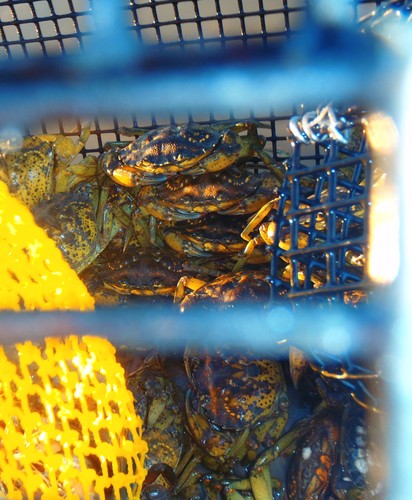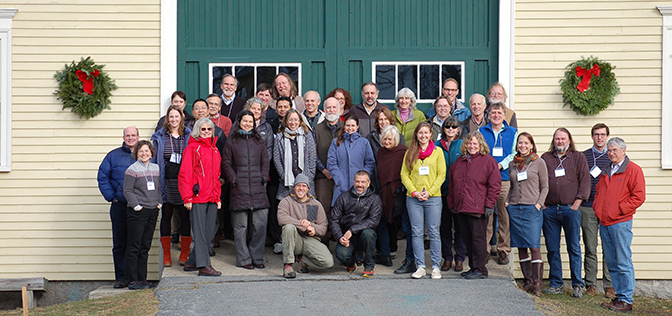The Wrack
The Wrack is the Wells Reserve blog, our collective logbook on the web.
The Wrack is the Wells Reserve blog, our collective logbook on the web.
 We've processed all the catch from another season of trapping green crabs (Carcinus maenas) and have some preliminary results to report.
We've processed all the catch from another season of trapping green crabs (Carcinus maenas) and have some preliminary results to report.
Between June and October we caught 6,432 green crabs. This is merely half the number of crabs as last year! In the figure below you can see that the catch was not distributed equally across the three trapping sites. Trends in numbers were similar to those seen last year. Again, the most crabs were caught in the Webhannet River, Wells (3,848) and the least in Broad Cove, Yarmouth (284).
I'm interested in the relationship between human communities and their environments. That is, how human activities have impacted watershed environments, coastal ecologies, and others and how environmental changes such as climate change and sea level rise are affecting human communities especially in coastal regions.
It’s been 7 years since we started collecting larval fish and 3 years since our last update (See Team Larval Fish at the Wells Reserve) so it’s time for another look at the wonderful world of larval fish! We’ve had some exciting developments over that time and attended some professional meetings where we have made connections with other researchers working on early life stages of fishes.
Back in September we reported on a current research project going on at the reserve — green crab sampling! We now have an update on this project, but first to refresh your memory…

Over the 2014 field season, research staff and interns participated in a green crab abundance study in hopes of getting a better understanding of population dynamics of this invasive species on marshes along the coast of Maine. We used modified eels traps baited with Atlantic herring, deployed two traps at a time per site, left them for 24 hours, and repeated this process eight times between June and October.

WELLS, Maine, December 8, 2014 — Scientists from around New England met at the Wells National Estuarine Research Reserve on December 5 for a workshop focused on “blue carbon” science and policy. For the first time, scientists from throughout the region gathered to share research results, identify gaps in knowledge, and plan future collaborations involving carbon in coastal habitats.
The term “blue carbon” refers to the ability of salt marshes, seagrass meadows, and mangrove forests to take up and store carbon dioxide and other greenhouse gases from the atmosphere. Coastal wetlands capture carbon and store it at rates even greater than rainforests.
“Carbon held naturally in coastal wetlands is not entering the atmosphere as a greenhouse gas, so these habitats have real potential to mitigate climate change,” said Dr. Kristin Wilson, Wells Reserve research director, who co-coordinated the workshop.
 The invasive European green crab is not only a popular topic in the media these days; here at the reserve green crabs are receiving their fair share of attention as well — 5,878 of them so far to be exact!
The invasive European green crab is not only a popular topic in the media these days; here at the reserve green crabs are receiving their fair share of attention as well — 5,878 of them so far to be exact!
The Wells Reserve has teamed up with the University of Maine, Casco Bay Estuary Partnership, and Southern Maine Health Care to study the impacts of the invasive European green crab (Carcinus maenas) on the geology and “stability” of our marshes. Over the summer we have been collecting abundance data that will later be used in conjunction with fyke net data, water quality data, and even geological techniques to better understand the effects green crabs are having on salt marshes throughout southern Maine.
Create a U.S./Canada working group, identify research gaps, and establish a regional approach to blue carbon science and policy.